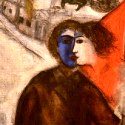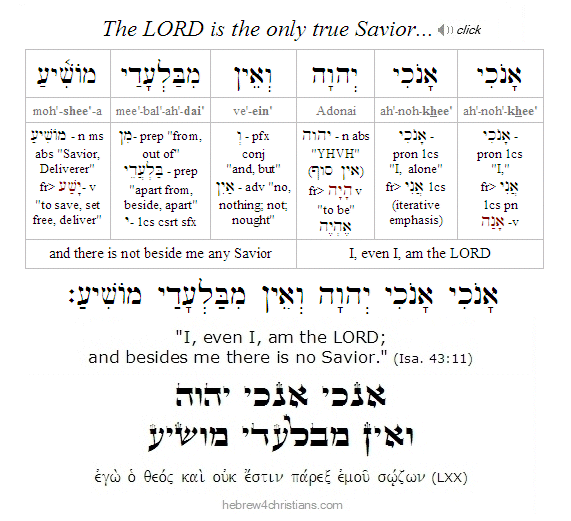|
Our Torah portion this week centers on the rebellion of Korach, a man who questioned God's authority and arrogantly sought to "intrude" into the office of the priesthood. It is noteworthy that his rebellion is explicitly mentioned only once in the New Testament - in the Book of Jude - as an example of the fate that awaits those false teachers who likewise despise God's law. Unfortunately, Jude's warning is often neglected today, probably because people feel uncomfortable over the prospect of God's judgment. After all, in our "politically correct" age, people have been indoctrinated to regard "tolerance" as the greatest of virtues and "intolerance" (even of evil) as the greatest of vices.... Most unbelievers don't mind hearing the "good news" of God's love, but they take exception when they are confronted with their personal duty to live according to the moral truth revealed in the Torah. False teachers within the church are dangerous because they feed on this sense of discomfort and attempt to rationalize it away. Jude identifies them as spiritual impostors who "work from the inside" to confound or obscure the truth of God. Such a charlatan may appear to be a genuine believer, but their hidden agenda is to sow confusion and sin among God's children. They are proverbial "wolves in sheep's clothing" (Matt. 7:15). Jude's warning is especially important for us to heed in this present hour, because in the time immediately preceding the coming of the Messiah, spiritual deception and unbridled godlessness will greatly increase (2 Tim. 3:1-5).
Jude (i.e., Judah: יְהוּדָה) was the brother of James, the original leader of the believers in Jerusalem who ardently called on followers of Yeshua to perform acts of righteousness to demonstrate genuine faith (James 1:22; 2:14-26). The Book of Acts records that it was James - along with the elders in Jerusalem - who advised the Apostle Paul to demonstrate his allegiance to the Torah by offering sacrifices at the Temple (Acts 21:18-26). Both James and Jude were half-brothers of Yeshua, though at first they did not believe his messianic claims (John 7:5; Mark 3:31-34). After the resurrection Yeshua personally appeared to James (1 Cor. 15:7), who later became the leader of the original Messianic assembly in Jerusalem (Gal. 2:9). The events surrounding the conversion of Jude are not recorded in the New Testament, though in the salutation of his letter he simply identified himself as "a slave of Yeshua the Messiah and the brother of James" (Jude 1:1), assuming that his readers would be fully aware of his identity within the Messianic community. Jude apparently attached no weight to his earlier family relationship with Yeshua as his half-brother, especially in light of Yeshua's teaching that his true family were those who trusted in him (Matt. 12:48-49).
At first Jude had intended to write something else, but he then felt compelled by the Holy Spirit to warn us about the infiltration of false teachers and to "earnestly contend for (i.e., ἐπαγωνίζομαι, "agonize over") the faith that was once and for all delivered to the saints" (Jude 1:3). It should be noted here that there are strong correspondences between Jude's letter and Peter's second letter (i.e., 2 Pet. 2:1-3:3). Jude begins his letter by warning his readers that "certain people have crept in among you" who pervert the message of the grace of God by implying that we are free to sin (Jude 1:4). Notice that Jude said these men had "crept in" (παρεισδύω), a derogatory word that means they sidestepped or "entered around" the honest way.... The word translated "pervert" in this verse might better be rendered as "exchanged" or "turned around" (i.e., μετατίθημι), since these teachers "interpreted" God's grace to be "licentiousness" (ἀσέλγεια), that is, a license for sin. Perhaps these "creeps" taught that because of the sacrifice of Yeshua, the Torah of Moses was made obsolete, and therefore the "truth" of God was all about unconditional love based solely on faith -- regardless of our behavior. This is sometimes called "antinomianism" (from ἀντί, "against" + νόμος, "law"), a false doctrine that claims that a believer in Yeshua is freed from all laws (including the moral law of God expressed in the Torah). We find evidence of this "lawless" line of thinking in some of the writings of the early Greek "christian fathers."
It is important to see that the primary characteristic of a false teacher is that they "deny our only Master and LORD, Yeshua the Messiah" -- that is, they deny His moral authority and identity as the LORD God. Since Jude is writing to those who are "beloved by God," that is, to sincere Jewish believers, he is careful to remind us that it was Yeshua Himself who saved the people from Egypt -- but afterward destroyed those who did not believe (Jude 1:5). In other words, Jude wanted to ensure that we fully understand that it was Yeshua who was the thunderous "Voice of the Living God speaking from the midst of the fire" at Sinai (Deut. 5:26), and therefore to regard Him as none other than the great Lawgiver Himself (Matt. 5:17-7:29). That is why he is called "our only Master and LORD," and to esteem him as anything less is to deny the reality and truth of God.
Hebrew Lesson
Isaiah 41:11 reading (click):
Many churches today teach that we can (and should) disregard the moral law of God. They may give lip service to the "old testament," and they may claim it is still of "historical interest" that provides some interesting illustrations, but they arrogantly discount its essential message of holiness as being inapplicable to our daily lives. Often they are antinomian, teaching that we are no longer "under the law" and therefore are free to live in sin. Because they disregard (or "reinterpret") the clear moral teaching of the Torah (and the New Testament), they wink at fornication, support alternative "marriages," endorse gay clergy, and clamor for abortion rights. Many of the institutionalized churches promote syncretistic "replacement theology" that invent rituals, holidays, and symbols that are alien to the truth revealed in the Jewish Scriptures. These churches are often tolerant of "universalism," new age mysticism, and regard postmodern skepticism as "trendy." They may claim they are "seeker sensitive" but this is often "code" that they disregard the moral duty believers have to walk in righteousness. And because of their willful ignorance, some of these churches unthinkingly accept anti-Jewish propaganda - despite the irrevocable promises God has made to the Jewish people. Jude likens advocates of such doctrines to be "inhabitants of Sodom and Gomorrah" who will likewise be judged by God with eternal fire...
In this connection let me remind you of a verse from the New Testament: "Let no one in any way deceive you, for it [Yeshua's return] will not come until the apostasy (ἀποστασία) comes...." (2 Thess. 2:3). The word "apostasy" literally means "standing away" (ἀπό + ἵστημι) from the truth while making a pretense of abiding within it. In Hebrew, the word is meshuvah (מְשׁוּבָה), one who "turns away" from God. It is not a word that describes an unbeliever as much as it describes a traitor.... Some people think there will be a great time of revival just before Yeshua returns, but unfortunately that is not true. Indeed, Yeshua asked if he would find anyone who had faith at that time (Luke 18:8). At any rate, Jude states that those who "creep into" congregations to teach truth contrary to the revealed will of God are apostates, and the judgment they face is terrible to consider.
Jude reminds us that God is the same "yesterday, today, and forever," and His moral will was not suspended or "superseded" through the advent of Yeshua. Indeed, Yeshua clearly amplified the teaching of the Ten Commandments, insisting that they were to be obeyed from the heart, not merely adhered to as an external law code (Matt. 5:21-48). After all, it was Yeshua Himself who saved the Israelites from Egypt and led them to Sinai but who later destroyed those who did not believe (Jude 1:5). The Exodus generation fully understood the promise of God: "I will bring you out from under the burdens of the Egyptians; I will deliver you from slavery to them; I will redeem you with an outstretched arm and with great acts of judgment; I will take you to be my people... and I will bring you into the land that I swore to give to Abraham, Isaac, and Jacob" (Exod. 6:7-8). They understood all this - and they had personally experienced God's direct intervention - yet they failed to believe and therefore were decreed to wander about in the desert until they perished.
A false teacher is a pretender - someone who masquerades as a sincere believer. Paul described them as "deceitful workers, disguising themselves as apostles of Messiah" who therefore mimic the workings of Satan who disguises himself as an "angel of light" (2 Cor. 11:13-14). They have an outward show of spirituality, but ultimately they deny its reality and power (2 Tim. 3:5-6). Jude calls them "dreamers" (ἐνυπνιαζόμενοι), charismatic teachers who claim they receive direct messages from God. Invariably these people defile the flesh and question divine authority, particularly the authority of God as our moral lawgiver. They arrogate to themselves great "knowledge" by claiming that they are the recipients of special revelation that negates the plain meaning of the Scriptures. Ultimately, they slander what they do not naturally understand and ironically are destroyed by their carnal instincts, which they claim is the source of their revelation (Jude 1:8-10).
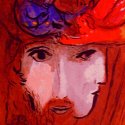
Jude then uttered a woe of denunciation upon false teachers, whom he likened as "spiritual descendants" of three notorious sinners mentioned in the Torah (Jude 1:11). First he said these teachers follow the "way of Cain" (דֶרֶךְ קַיִן), who was the earliest example of one who willfully chose the path of evil. Cain was a "natural man" who believed that his own efforts to find favor with God were sufficient. Unlike his righteous brother Abel, Cain denied the need for blood atonement by refusing to sacrifice a little lamb. His self-styled religion led him to offer up fruit from the earth. Cain disregarded the promise God gave to his parents about the Promised Seed and ignored the covering of grace that God had given them. His character of heart was later revealed when he murdered his brother in a fit of jealous rage.
Next Jude says false teachers follow the "error of Balaam" - the corrupt prophet who sought to curse Israel. The apostle Peter mentioned "the way of Balaam, the son of Beor, who loved gain from wrongdoing" (2 Pet. 2:15), and the Book of Revelation mentioned "the teaching of Balaam, who taught Balak to put a stumbling block before the sons of Israel" (Rev. 2:14). Balaam was a spiritual hireling who used his talents to obtain money, fame, applause, respect, and so on. He was a spiritual prostitute who wanted to sell his services without regard for the truth (Num. 22:7, Deut. 23:4-5). Though he appeared to follow God's instructions, his inner attitude was actually hostile to God's desire and plan. He was therefore double minded, antagonistic to the way of truth, and therefore literally insane (2 Pet. 2:16). When Balaam told King Balak's emissaries that he could "only speak what God put in his mouth," he was being literal, not moral... This is revealed in the fact that he was willing to try three times to curse God's purpose, but every time God thwarted his evil intent.
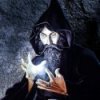
It is interesting to note that the name Balaam (בִּלְעָם) means "not of the people," which alludes to the fact that he sought to curse the Jewish people and bring them into judgment. Despite being miraculously rebuked by his donkey - and directly warned by the LORD Himself - Balaam continued to plot against Israel until he finally was successful by using women from Moab to seduce the men of the camp at Baal Peor (Num. 31:16). Since he was foiled in his attempts to directly curse Israel, Balaam reasoned that seducing Israel to sin was the way to eventually bring them to ruin. But Balaam forgot that God was not only Israel's Judge, but also Israel's Savior. He was later killed by the sword while fighting the Israelites before they entered the Promised Land (Num. 31:8).
Finally, Jude likened false teachers to Korach who rebelled against the LORD. Korach, as we know from our Torah portion (Korach), was discontented with his lot and sought to obtain power by arrogating the office of the priesthood for himself. He was consumed with envy and resentment because he was not chosen to be a preeminent leader among the people, and therefore he attacked Moses and questioned the authority of his teaching. Korach wanted to be center-stage in God's plan, and when he realized that he wasn't, he felt mortified over his status. Ironically, Korach's slanderous accusation that Moses and Aaron "exalted themselves above the assembly of the LORD" was the hidden reason why Korach sought to rebel. Korach's lust for power finally consigned him to a state of hardened defiance, which moved him to attempt to overthrow God's order.
On the surface, Korach certainly looked good. As a Kohathite, he had a lot of credibility. He was Moses' cousin, after all, who shared the same family tree reaching back to the chosen son of Levi himself. And he was undoubtedly intelligent and eloquent as well. You can almost hear him talking with Dathan and Abiram, consoling them for being "second class" citizens in Israel, disingenuously arguing for a return to the "good old days" of Jewish religious life in Egypt, when all firstborn sons were accorded equal stature in the eyes of God... But of course we know how the story ends: Korach's lust for power and arrogant repudiation of God's law brought swift and terrible judgment as he was swallowed up alive by the earth. Notice that Jude describes Korach's "rebellion" using the word antilogia (ἀντιλογία), which means to "speak (λέγω) against (ἀντί)," or to contradict the word of truth (Jude 1:11). Jude's point is that teachers who seek personal power by denying the authority of God's Torah will suffer a fate similar to Korach...
To quickly summarize, Jude warned us that false teachers would deceptively "creep into" our midst, and therefore he sought to expose them by revealing their inner motivation and character. First of all, they would (secretly) deny that Yeshua is Master and LORD and promote license to sin by denying the authority of the Torah. They would masquerade as true believers, and claim to receive special revelations from God. Inwardly, they would be carnal and self-righteous, like Cain; they would be treacherous and greedy, like Balaam, and they would be jealous for power and contrary, like Korach.
Jude then used a metaphor to say that false teachers are like "hidden rocks" that cause shipwreck when a ship seeks harbor (Jude 1:12). They attend fellowship meals, ravenously feeding themselves without reverence before God, and therefore are a danger to others. They are deceptive in their words and are likened to "waterless clouds" that appear to be life-giving, but are empty and dry. They are "fruitless trees in late autumn, twice dead, uprooted," indicating that their lives are devoid of the fruit of the Spirit. They are "wild waves" and "wandering stars," who follow their own lawless course (Jude 1:12-13). They are experts at giving an opinion, ranting about politics or world events, but they disregard the plain message of the Scriptures to live in holiness and faith. To them, Jude says, is reserved the blackness of darkness forever -- a terrifying image of hell -- and upon them will be fulfilled the prophecy of Enoch regarding divine retribution that is promised to the ungodly at the end of the age (Jude 1:14-15).
But Jude is not finished describing the hidden character of these dangerous impostors. "They are grumblers, malcontents, following their own sinful desires; they are loudmouthed boasters, showing favoritism to gain advantage" (Jude 1:16). Here Jude notes that false teachers are essentially "man pleasers" who flatter others (or seek applause) for their own personal advantage. They rant about spiritual things with an aim to inciting the flesh. As entertainers, they seek the approval of the crowd and delight to impress an audience. Many of them are "ear-tickling" hucksters who make a living by peddling carnal doctrines on television or on radio. Others promote themselves as "specially anointed" teachers and prophets who "fleece the flock" by making empty boasts... These are those charlatans and snake-oil salesmen who cruelly offer you a "miracle" -- but only if you offer up cash for the benefit... Still others are professors in seminaries who hide their unbelief by "deconstructing" the Scriptures and intellectualizing the faith. These professors often function as denominational "gate keepers" to create "professional clergy" prepared to serve in institutionalized churches. Jude reminds us that the apostles and Yeshua Himself warned us that such mockers would come who would make a pretense of the faith while pursuing their own ungodly desires. These are teachers who cause divisions and are "sensual (ψυχικός, literally soulish), devoid of the Spirit" (Jude 1:17-19).
The description that false teachers are "soulish" (ψυχικός) but "without the Spirit" clearly identifies them as unregenerated people, and by implication, this description provides some insight into the nature of a regenerated person as well. The "natural man" is a fallen creature who is devoid of spirit (ruach) as a result of the inherited sin condition of Adam and Eve. As such, he is alienated from the Spirit of God (Ruach Hakodesh) and unable to apprehend the Divine Presence. Such a person is composed primarily of body (i.e., basar) and a soul (i.e., nefesh), and the will instinctively is directed toward the satisfaction of the ego and its needs. The "heart" (lev) of such a person is centered in the lower desires of the soul, which drives the emotions, instincts, and so on. When a person is reborn by the Holy Spirit, however, he is made into a new creation (בְּרִיאָה חֲדָשָׁה) and a "rebirthed spirit" is divinely imparted by which he can communicate with God. The Holy Spirit then writes the Torah upon a new heart (i.e., lev chadash) that directs the will to seek the LORD and to live in His Presence:
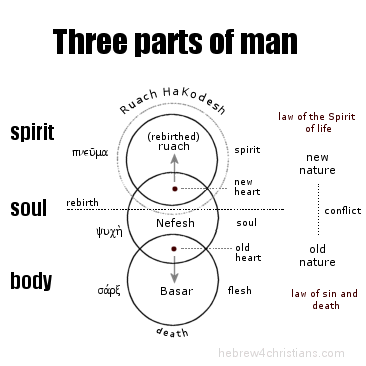 |
This "tripartite" model of the regenerated person helps explain the struggle we have with sinful impulses in our lives. The "new nature" seeks to please God, yet the "old nature" selfishly desires to gratify the instincts of the flesh. These desires find their correspondence in the "law of the Spirit of life" and the "law of sin and death," respectively. "For the desires of the flesh are against the Spirit, and the desires of the Spirit are against the flesh, for these are opposed to each other, to keep you from doing the things you want to do" (Gal. 5:17). We are set free from this conflict by faith - by being led by the power of the Holy Spirit. "If we live by the Spirit, let us also walk by the Spirit." Our relationship with the "Second Adam" imparts to us life-giving spirit (1 Cor. 15:45), and the resurrection of Yeshua gives us power to walk in newness of life. "Just as we have borne the image of the man of dust, let us also bear the image of the man of heaven" (1 Cor. 15:49). "Now may the God of peace himself sanctify you completely, and may your whole spirit (רוּחַ) and soul (נֶפֶשׁ) and body (גְּוִיָּה) (i.e., τὸ πνεῦμα καὶ ἡ ψυχὴ καὶ τὸ σῶμα) be kept blameless at the coming of Yeshua our Messiah and LORD" (1 Thess. 5:23). We are sanctified by the truth of the Word of God (John 17:17), which pierces "even to the point of dividing soul from spirit (ψυχῆς καὶ πνεύματος), and joints from marrow" (Heb. 4:12).

We can guard against false teachers by using discernment to test their spirits (1 John 4:1), but we can only be equipped to do so if we "build ourselves up in the most holy faith" (Jude 1:20). We build ourselves up by carefully studying the word of God - especially the Torah, since it is the foundation of all that follows. In this way we will be able to accurately wield the Sword of the Spirit (2 Tim. 2:15-16, 2 Pet. 1:19-20). In order to grow, we must have "good soil" for the seed of the word to take root. We "get rooted by knowing the roots" of our faith! Studying the Scriptures and praying in the Holy Spirit keeps us securely in the love of God as we wait for the mercy of Yeshua who gives us eternal life (Jude 1:21). This will equip us to show mercy to those who have honest doubts and to save those who are defiled by sin (Jude 1:22-23).
Jude's benediction is beautiful and profoundly reassuring, since it magnifies God's salvation secured to us through Yeshua our LORD: "Now to him who is able to keep you from stumbling and to cause you to stand blameless before the presence of his glory with great joy, to the only God, our Savior, through Yeshua the Messiah our Lord, be glory, majesty, dominion, and authority, before all time and now and forever. Amen" (Jude 1:24-25).
Wow... what a powerful and timely message!
Let me add only that Jude's warning is primarily given so that believers will be on guard for false teachers in their midst. Though we must "test ourselves to see if we are in the faith" (2 Cor. 13:5), we are given the Spirit of truth (רוּחַ הָאֱמֶת), so we can know the truth revealed by God (1 Cor. 2:10-14; 1 John 4:6). This is not meant to suggest that we know everything, of course, since we walk by faith and presently "see through a glass darkly." Nevertheless we can find great comfort when we understand that God has solemnly promised to help us to persevere in the way of truth. We must continue trusting in His providential care for us as we make our way back home.
One final thought. Godly teachers deserve our support and prayers, since they are appointed by God Himself to "equip the saints" for service (Eph. 4:11-13). Indeed, the ministry of accurately sharing the truth of the Scriptures is more vital than ever in this day of great apostasy. So please - support those teachers out there that are earnestly laboring to make the voice of truth be heard in this world... Some people tend to regard sound teaching as something that should be given out freely, though the Scriptures are clear that "one who is taught the word must share all good things with the one who teaches" (Gal. 6:6; 1 Cor. 9:11, 14, 1 Tim. 5:18). On the other hand, teachers are warned that they must accurately teach (ὀρθοτομέω, lit. "cut straight") the message of truth (2 Tim. 2:15) and will be subject to a stricter judgment than other believers for the content of their teaching (James 3:1).
The Hebrew word for education is chinukh (חִנּוּךְ), a word that shares the same root as the word for "dedication" (i.e., chanukah: חֲנֻכָּה). True education of the Scriptures is therefore foundational to being a student of the Messiah. All disciples of Yeshua are called "students," or talmidim (תַּלְמִידִים), a word that comes from lamad (לָמַד) meaning "to learn" (the study of Scripture is called talmud Torah (תַלְמוּד תּוֹרָה) from the same root). Among other things, then, following Yeshua means becoming a student of the Jewish Scriptures that He loved and fulfilled (Matt. 5:17-18; Luke 24:44-45). Only after learning the truth of the Scriptures will you be equipped to "go to all the nations and teach" others (Matt. 28:19). This is accomplished not merely by explaining (propositional) doctrine but by kiddush HaShem -- sanctifying the LORD in our lives (1 Pet. 1:15-16). As the sages noted long ago: "Upon three things the world does stand: upon the Torah (truth), upon worship, and upon acts of lovingkindness" (Avot 1:2). We are called to be a "living letter" sent to the world to be "read" (2 Cor. 3:2-3).
Yeshua promises those who put their trust in Him: "You will know the truth, and the truth will set you free" (John 8:32). May God watch over you, keep you, and give you the glorious liberty to obey Him in the truth, chaverim....
|


